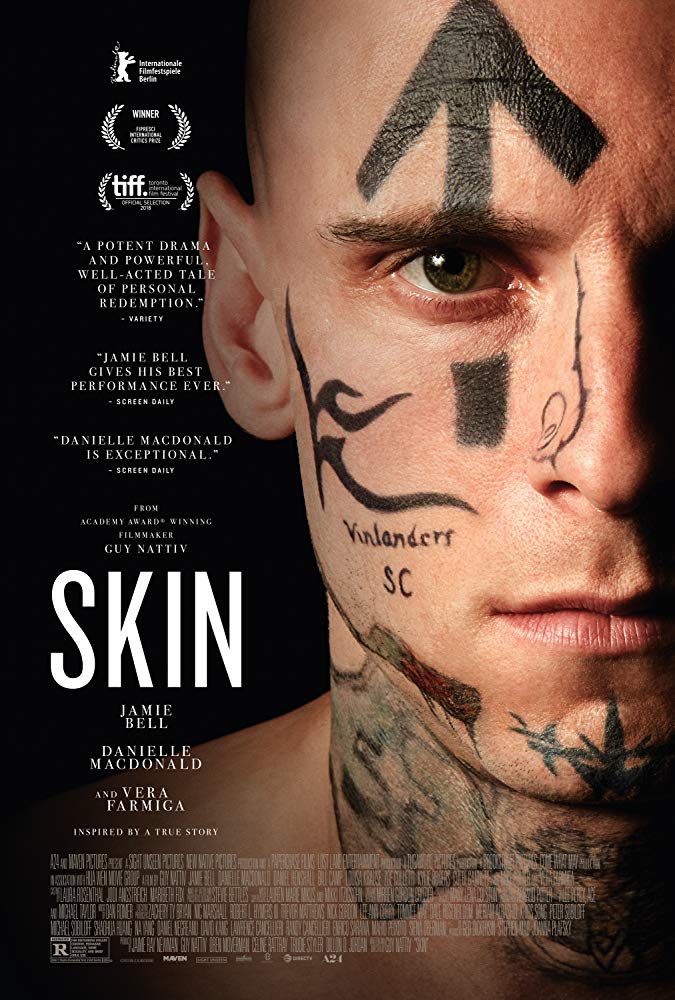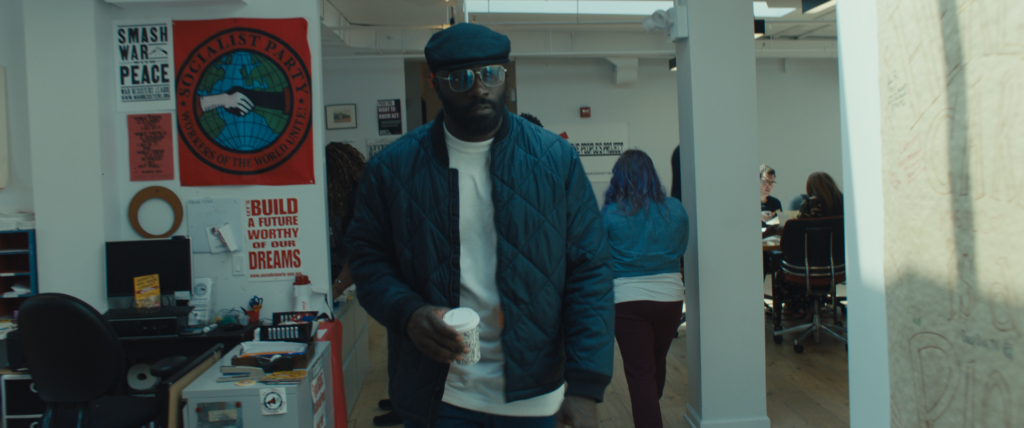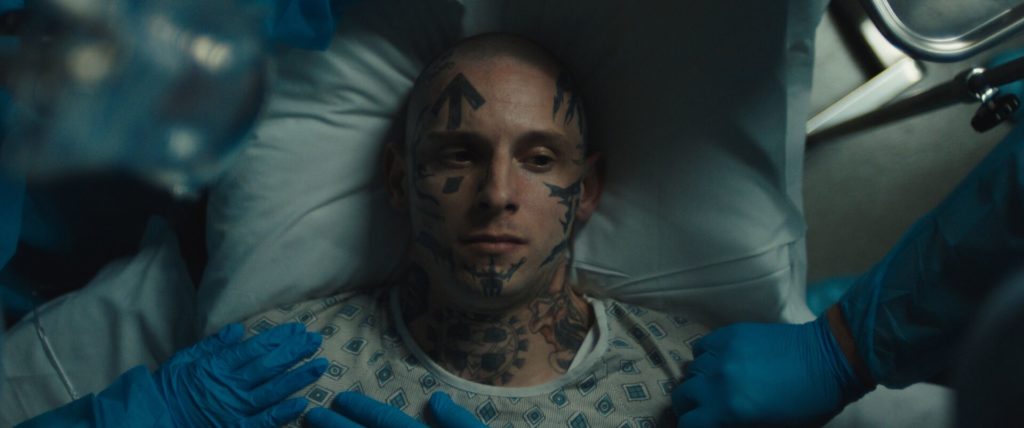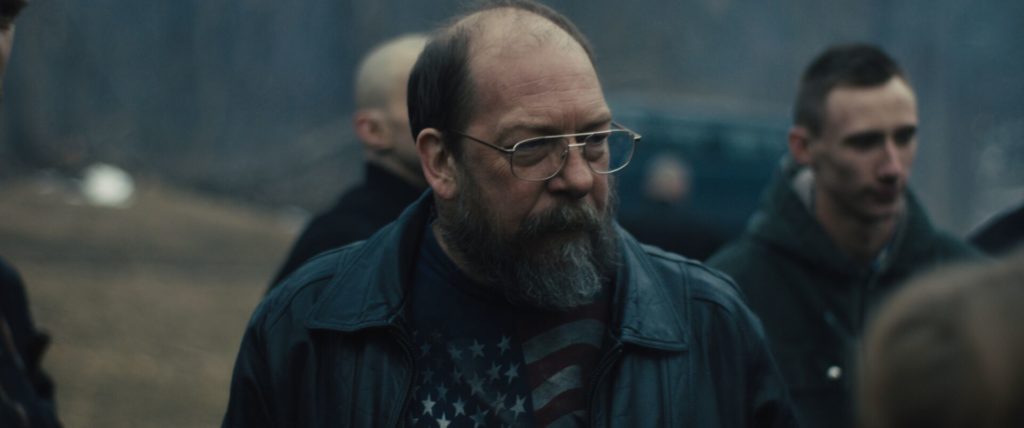With every passing day we are reminded in some heinous fashion or other of the long-simmering violence and hatred stemming from racism and white supremacism across this country and beyond. No longer something “hidden” or not discussed, these issues are at the forefront of the conversation in today’s world. And that is what makes Guy Nattiv’s SKIN the most timely and topical film in America right now.

Intense. Visceral. Brutal. SKIN is an incredible and indelible character study of a man at a crossroads wanting a different life, a better life, but feeling the push and pull within himself of a world he knows and which he has been a part of for years, a world filled with hatred, racism, and violence. How does a man leave that familiarity for the unknown? Based on the true story of Bryon Widner, a longtime white supremacist and member of a Neo-Nazi group, with SKIN, Nattiv brings Widner’s story to life in narrative form; a story of a man who eventually “saw the light” and knew that discriminatory and racist mindset and conduct was not any way for him to live his life. Widner chose to get out, but it wasn’t easy and it wasn’t without violence and hatred turned on him by the very people who professed to care about him for years.
Championed by producer Oren Moverman and written and directed by Nattiv, Jamie Bell delivers what may well be the performance of his career as he steps into the life and mind of Bryon Widner. Don’t be surprised to hear Bell’s name called outcome Oscar nominations morning in January, as well as being a frontrunner with various critics’ societies. Bell taps into a hidden humanity within Widner and finds a way for the audience to connect with the character. We get under Widner’s skin thanks to Bell.

Not only does Bell physically transform himself for this role, but the emotional transformation and level of gravitas is astonishing. Bell makes us feel Widner’s detachment from humanity as he drives himself into the darkness of Widner having dedicated his life to hatred, only to get a wake-up call in the form of a young woman named Julie and her children. Bell brings us into the addictive cyclical relationship of hatred and blindness, embracing the complexity of the man and the situation. He is mesmerizing.

Making SKIN accessible to the average moviegoer is due in large part to the objectivity that Guy Nattiv brings to the table. The film is non-judgmental. Nattiv allows the audience to see and experience for themselves and then make up their own minds on the issues at hand. At its core, this is a film about redemption and forgiving oneself in order to change and move on. An Israeli filmmaker, SKIN marks his North American debut. It was through an article he was reading while in a Tel Aviv coffee shop that he learned of Widner’s story and knew that it needed to be told.

Finding and walking that fine line between truth and authenticity, while taking some literary license for cinematic purpose, is always challenging for a filmmaker, but more so with a story like this. While Widner opened up his entire life to Nattiv, as did Daryle Lamont Jenkins who is the anti-fascist activist who helped Widner, some facets of the story cannot be disclosed because of being part of ongoing FBI investigations and sealed files. Nattiv shapes the script with a realism that pushes the envelope as far as possible to convey not only Widner’s personal experiences, but living within a racist white supremacist group such as that in which Widner was a part.

Never shying away from realism or the brutality of events, it is impossible not to see how vile and heinous these individuals and their beliefs are, going so far as to almost serve as a double-edged sword by inciting anger within the moviegoer.

Working with cinematographer Arnaud Potier, the visual tonal bandwidth is dark, gritty. There is a subtle greenish palette that’s awash over the entire film, giving one the sense of a sickening feeling in the pit of the stomach. Giving the film an almost “European feel”, Nattiv captures elements of rural America that are poetic in nature; not only serving as a contrast to the visceral gritty tone of the film, but something that tacitly speaks to the good that is present in the world.
Surprising for a smaller budget film like SKIN is the staging of some of the scenes, particularly the rallies. Rather than use stock footage or archival news footage of recent events, Nattiv stages several Neo-Nazi rallies and gatherings as well as multiple scenes involving violent attacks by the group. The opening scene of the film is a real standout and sets the tension-fraught tone of the film as a whole. Extremely powerful and palpable, the cameras are constantly in motion, opening with aerial wide shots that give one a sense of the magnitude of the event, but then zooming in and out on specific clusters of people or individuals. The reality of the scene is emotionally chilling. Aiding in the reality of the film are multiple night scenes which are shot night-for-night with minimal lighting, sometimes only with torches or incendiary devices.

Interior lensing is what helps shape the character of Bryon Widner as we see him in a family setting once he gets involved Julie, her three young children and their dog Boss. Lighting is soft. Framing is tight. We feel the closeness Bryon is starting to embrace; the closeness which is drawing him away from the supremacists. Countering that are encounters with his supremacist family which always call for wider framing and rigidity. Lighting is harsh. There is no intimacy within that group and there is always a physical space between the individuals; an interesting visual which carries well emotionally. Key to the visual metaphor throughout the film is the use of natural light and handheld camerawork with dutched angles playing to the power of a character in each scene.

A running visual throughline are montage transitions, all shot in extreme close-up and with a denatured blue note. These transitions depict the two-year process of the removal of several hundred tattoos covering Bryon’s body. From a storytelling and editing standpoint, this thread is not only a welcome respite to much of the physical and emotional brutality, but reinforces the idea of change and that there is a light at the end of the tunnel.

There is a freshness of performance throughout the film which is a credit to Nattiv’s cast. Going beyond Jamie Bell, Danielle Macdonald is standout as Bryon’s girlfriend Julie. The chemistry between Bell and Macdonald is believable and resonant. Chilling are the performances from Vera Farmiga and Bill Camp as Shareen and Fred Krager, the “parents” of this particular supremacist group of which Bryon is a member. Although with somewhat limited screen time, Mike Colter provides a welcoming positivity and energy as Daryle Jenkins every moment he is on screen.
SKIN is a no holds barred look into one man’s soul; a man who changed and put hatred and racism behind him for a better life and hopefully, a better world. SKIN is a “must see” film for our time.
Written and directed by Guy Nattiv
Cast: Jamie Bell, Danielle Macdonald, Vera Farmiga, Bill Camp, Mike Colter
by debbie elias, 07/11/2019












